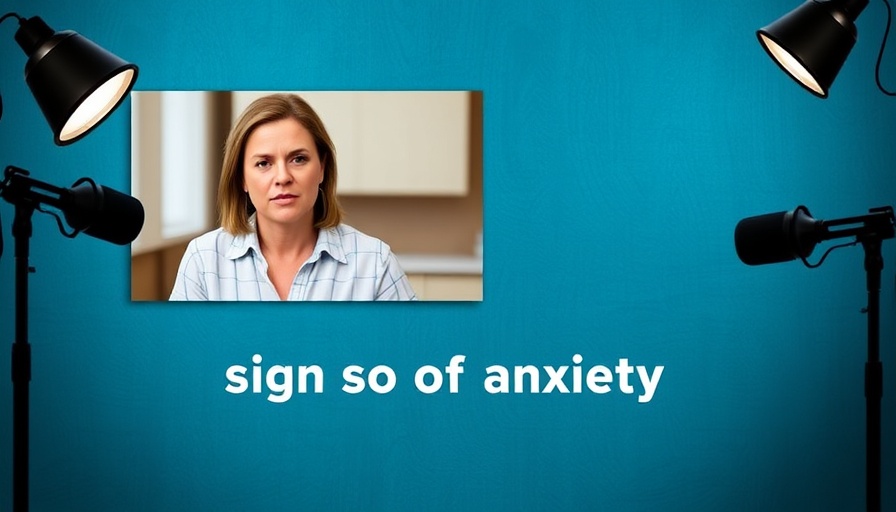
The Rise of Health Anxiety: Understanding Its Symptoms and Impact
Health anxiety, often known as hypochondria, is a growing concern in today's fast-paced world. A considerable number of people regularly experience excessive worrying about their health, which can lead to significant distress and interference in daily life. For individuals aged 25 and over, recognizing the signs and understanding the effects of health anxiety is crucial.
In 'Signs of Health Anxiety | Josh Spitalnick, Ph.D.', the video discusses key indicators of health anxiety, prompting our analysis of its implications for health and wellness.
Identifying the Signs of Health Anxiety
Many people may not even realize they are experiencing health anxiety. Common signs include obsessive thoughts about potential illnesses, frequent checking of bodily symptoms, and seeking reassurance from medical professionals or loved ones. This behavior often leads to an endless cycle of worry and a constant search for validation regarding one’s health.
Social Connection: Why Addressing This Issue Matters
In our contemporary society, conversations surrounding mental health are becoming increasingly necessary. Acknowledging health anxiety is vital not only on an individual level but for the community at large. When we talk about health, we often overlook the psychological aspects. By fostering an environment where health anxiety can be discussed openly, we can alleviate some of the stigma associated with it. This not only encourages those affected to speak up but helps dispel misconceptions about anxiety and its relationship with physical health.
Parallel Examples to Illustrate Health Anxiety
Consider the case of Jane, a 35-year-old woman. After reading about a new virus, she becomes convinced that symptoms she experience—a mild cough, fatigue—are indicators of a serious illness. Despite multiple visits to her doctor and extensive tests that reveal nothing unusual, Jane remains anxious about her health. Her experience is not isolated. Many like her find themselves trapped in similar cycles, raising the question: How can we effectively combat health anxiety?
Future Predictions: Opportunity for Awareness and Solutions
As health anxiety becomes more recognized, we might see integration into mental health awareness campaigns. Initiatives that educate individuals about the psychological side of their health could transform how we approach anxiety disorders. Mental health support measures will likely encompass a more holistic view that includes physical wellness and promotes healthy lifestyle habits.
Practical Insights for Coping with Health Anxiety
Coping with health anxiety involves a combination of strategies aimed at reducing stress and improving overall mental well-being. Here are some practical approaches:
- Mindfulness Meditation: Engaging in mindfulness practices can help ground individuals in the present moment, reducing worries about possible illness.
- Physical Activity: Regular exercise not only contributes to a healthy body but also promotes mental wellness through the release of endorphins.
- Nutritional Support: Maintaining a balanced diet rich in vitamins and healthy foods can enhance overall well-being, acting as a natural support for both the immune system and mental health.
Risk Factors and Challenges Associated with Health Anxiety
For many individuals, health anxiety may stem from past experiences with illness, family history, or even information overload from media sources. These risk factors create a backdrop for individuals to constantly seek reassurance or obsess over minor symptoms. The challenge lies in breaking this cycle, requiring both self-awareness and proactive coping mechanisms.
Encouraging Conversations Around Mental Health
It's imperative that we foster discussions surrounding health anxiety to better understand its impact. Encouraging openness about these feelings can lead to more support networks. Talking to friends, family, or mental health professionals can help. Remember, you're not alone, and reaching out can make a difference.
Conclusion: Taking the First Step Towards Healing
If you're grappling with health anxiety, consider exploring therapies or support systems that resonate with you. Seeking help is an essential part of the healing process. Regular self-care practices, along with mindfulness and physical activity, can pave your way to a more balanced, healthier life. Don't hesitate to reach out to a mental health professional—your emotional well-being is just as crucial as your physical health.
 Add Element
Add Element  Add Row
Add Row 



Write A Comment